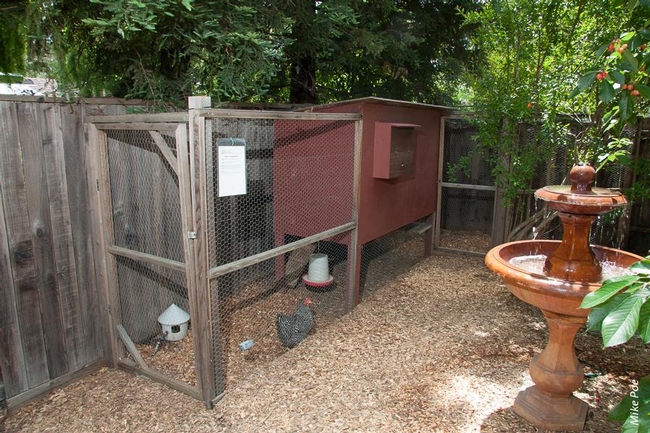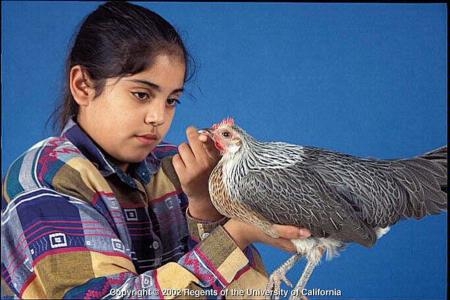
Posts Tagged: chickens
Poultry owners asked to monitor their birds for virulent Newcastle disease
Commercial and backyard poultry owners are asked to be attentive to their animals' health to help prevent the spread of the lethal and contagious virulent Newcastle disease now raging in Southern California, reported Bob Rodriguez in the Fresno Bee.
Symptoms of the disease include sneezing, coughing, green watery diarrhea, neck twisting, paralysis, decreased egg production and swelling around the eyes and neck, according to Maurice Pitesky, UC Cooperative Extension poultry specialist.
He said the popularity of backyard chickens is one of the challenges to controlling the disease. He estimates there are about 100,000 homes with poultry, with each home averaging five chickens.
"That is a lot more than in 2002, when we had the last outbreak (of virulent Newcastle disease)," Pitesky said. In 2002, the disease started in a backyard flock and eventually spread to 22 commercial poultry farms, killing 3.2 million birds.
"While people have the best of intentions, unfortunately a lack of biosecurity practices in people's backyards is one of the contributing factors of the disease spreading," Pitesky said.
Birds can become infected by coming into contact with other birds that are carrying the disease or by humans that carry the disease in their clothes or shoes. Pitesky said the disease also spreads when people purchase birds from a private party who may not be able to verify the bird is disease free.
He recommends buying from a hatchery or feed store that is affiliated with the National Poultry Improvement Plan, an organization that focuses on disease control.
“The goal is to be preventative,” Pitesky said.
If backyard chickens appear ill, owners should call the California Department of Food and Agriculture's State Bird Hotline at (866) 922-2473.
For more information on the disease, see the Virulent Newcastle Disease Outbreak Information and Resources page Pitesky has posted to his website, UC Cooperative Extension Poultry.
Salmonella infections resulting from backyard chickens
The Centers for Disease Control and Prevention is investigating a surge in human Salmonella infections linked to contact with live backyard poultry, reported Macy Jenkins on CBS Sacramento News.
The story included interviews with several chicken owners. One small girl said she loves to cuddle her chickens because "They're so cute." The owner of three specialty chickens said he allows the animals to "sleep inside with me in my bed." Both of those practices run counter to guidelines set by the CDC.
Jenkins spoke to UC Cooperative Extension specialist Maurice Pitesky, who said poultry owners should never let the birds inside of the house. His reason: "Always assume that any bird is a Salmonella carrier."
To prevent Salmonella infection, the CDC recommends:
- Always wash hands thoroughly with soap and water right after touching live poultry and anything in the area where the live and roam.
- Never allow poultry in the house, especially not in bathrooms and kitchen.
- Do not snuggle or kiss the birds.
- Stay outdoors when cleaning poultry equipment, such as cages, feed or water containers.
The most common symptoms of Salmonella infection are diarrhea, fever and abdominal cramps. The illness usually last 4 to 7 days, and most people recover without treatment.

As of May 25, 2017, the CDC reports 21 people in California have been infected by Salmonella via backyard chickens.
Backyard chickens ruling the roost in Bay Area

The story was centered in Hayward, a community that is the latest to deal with local interest in very small-scale poultry husbandry. San Jose, Oakland, Berkeley and San Francisco do not require a permit or fee. Some communities require permits to slaughter animals for food. In Palo Alto, chicken permits are $60.
Parr spoke to UC Agriculture and Natural Resources poultry expert Maurice Pitesky about the growing trend of backyard chicken ownership.
"It's part of a general trend toward local food," said Pitesky, who is a UC ANR Cooperative Extension specialist based at UC Davis. "People read things in the media and feel they might be able to have more control and safer food if they're growing it themselves. It's a growing trend in urban areas, and poultry are relatively easy type of food animal to raise."
The article provided a link to the UC Cooperative Extension Poultry website, which includes information for backyard poultry, small-scale production and commercial production.
Urban chickens are fun and a current fad

Among her sources for the story was the director of UC Cooperative Extension's Statewide Master Gardener Program Pamela Geisel, who keeps 10 hens at her own rural home west of Chico.
She said enthusiasm for homegrown hens in urban areas may be close to peaking.
“It’s sort of a fad,” she said. Still, “it’s easy to buy chicks, and they’re cheap."
Most of the potential problems tend to arise from having too many chickens in too little space, she said, so regulations for the size and housing of backyard flocks can “help chicken keepers be better chicken keepers.”
She cautioned that keeping chickens involves a significant effort.
“The poop just doesn’t go away — it’s a constant daily cleanup,” she said. “They get sick, they get parasites. For many people it’s just not worth the effort.”
California's growing marijuana business impacting agriculture
Harry Cline, Western Farm Press
California has the dubious distinction of being America’s biggest marijuana supplier. Approximately 75 percent of the marijuana sold in the U.S. is grown in California — not Mexico.
Michelle Le Strange, UCCE farm advisor in Tulare County, said she has been warned by county officials and law enforcement officers that she should be alert in driving a county vehicle in rural areas because marijuana plantation tenders might think she is a law enforcement officer, and she could be in danger.
Any government officials driving vehicles with government plates should be concerned because these marijuana plantations are operated by Mexican drug cartels, the same lawless gangs who are responsible for thousands of murders each year in Mexico. These cartels actually scour the U.S. Forest Service lands in search of ideal growing sites, often adjacent to running streams. The cartels stock these plantations with people, drip irrigation tubing and chemicals to farm the illegal weed.
Any chicken can shed salmonella
Last month's enormous egg recall continues to generate news coverage about efforts to keep salmonella-contaminated eggs out of the U.S. food supply.
Experts quoted in a Los Angeles Times story published yesterday agreed that salmonella contamination can happen in any egg production system - large operations, small family farms or in the backyard. Chickens infected with salmonella shed the pathogen in their feces, which can contaminate the egg shell. In rare instances, salmonella infects a hen's ovaries and can end up inside the eggs she lays, the article said.
A Texas A&M University professor said eggs from large-scale producers should, theoretically, be safer because they are subject to state and federal regulations requiring inspections and regular testing for pathogens, including salmonella.
A Louisiana State University professor said the cages on commercial farms have slanted bottoms so eggs roll out right after they're laid, making it less likely they will come in contact with hen droppings.
Michele Jay-Russell, food safety specialist at the Western Institute for Food Safety and Security at UC Davis, told reporter Elena Conis when a foodborne illness breaks out in a large commercial concern, the problem becomes a huge, national problem very quickly. But that doesn't mean smaller-scale production is safer.
The article cited two studies comparing the occurrence of salmonella in free-range and conventionally produced eggs:
- A 1996 study published in the journal Avian Disease found higher levels of a specific type of salmonella in free-range compared to caged birds.
- A 2004 study conducted by researchers at the Poultry Microbiological Safety Research Unit at the Richard B. Russell Agricultural Research Center in Athens, Ga., found no difference in salmonella levels in free-range chickens compared to conventionally raised chickens.

Backyard producers should also take precautions to avoid foodborne illness.
